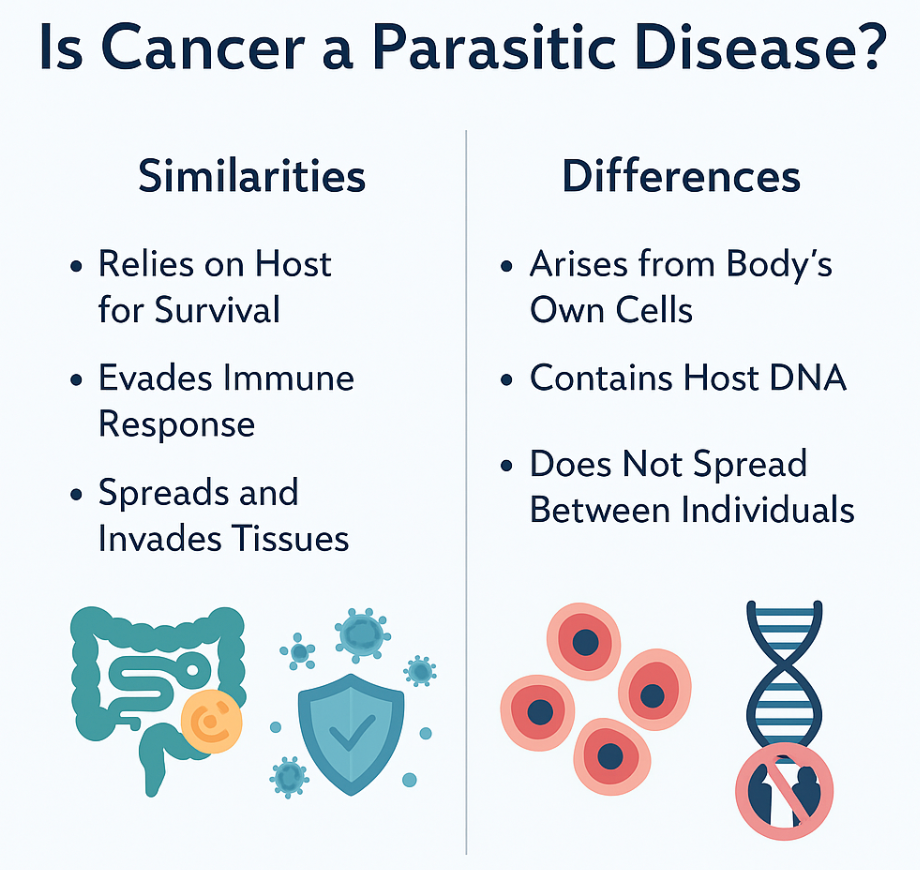Cancer as a “Parasitic” Disease? A Functional Oncology Perspective
About the Author
Dr. Corina Ianculovici, DNP, FAAMFM, ABAAM-HP, is a board-certified advanced practice clinician specializing in
longevity medicine, metabolic health, and hormone optimization and functional aesthetics.
She is the founder of Mirelle Institute for Anti-Aging Medicine in New Jersey.
What if we have been looking at cancer all wrong?

What if we’ve been looking at cancer all wrong? While cancer isn’t classified as a parasite, its behavior eerily mimics how parasites survive, spread, and subvert the human body. This lens could explain why anti-parasitic drugs like ivermectin and mebendazole—long used to treat worms and lice—are quietly emerging as powerful tools in experimental cancer care.In this blog, we explore the overlap between cancer biology and parasitology, present real peer-reviewed studies, and ask a question worth deeper scientific exploration: Could rethinking cancer’s behavior help us outsmart it using safe, repurposed therapies already at our fingertips?🪠 How Cancer Mimics a ParasiteLet’s consider a few facts:
- Hijacks resources from the host
- Evades the immune system
- Creates a microenvironment to support its survival
- Spreads to distant tissues, often lethally
- Manipulates host metabolism for energy
- Builds resistance to treatment like biofilms
Sounds like a parasite, doesn’t it?
If we treat cancer as a parasitic-like invader rather than just a mutation of our own cells, we open the door to therapies designed to starve, disrupt, and eliminate parasitic mechanisms.💊 Anti-Parasitic Drugs That Disrupt Cancer Metabolism1. IvermectinOriginally an antiparasitic for river blindness and scabies, ivermectin shows surprising multi-targeted anti-cancer effects:
- Disrupts mitochondrial respiration → Reduces ATP, increases ROS
- Inhibits PAK1/Akt/mTOR signaling → Induces apoptosis & autophagy
- Targets cancer stem cells (CSCs) → Blocks NANOG, OCT4, SOX2
- Counters P-glycoprotein activity → Helps overcome drug resistance
- Modulates immune response → Enhances antitumor immunity
Clinical spotlight: A Phase I/II clinical trial (NCT05318469) is investigating ivermectin + pembrolizumab in triple-negative breast cancer patients at Cedars-Sinai.2. MebendazoleAn old anthelmintic drug used for pinworms, mebendazole attacks cancer in ways similar to chemotherapy:
- Disrupts microtubule formation → Stops cell division
- Inhibits VEGFR2 & angiogenesis → Starves tumors of blood
- Suppresses HIF-1α, STAT3, and MYC → Reduces inflammation & resistance
- Induces apoptosis in resistant and brain-penetrant tumors
Bonus: Crosses the blood-brain barrier, making it a rare tool for glioblastoma and metastatic CNS disease.📈 Case report: A patient with metastatic adrenocortical carcinoma achieved durable response with 100 mg mebendazole BID long term.📊 Summary Table: Anti-Parasitic Drugs and CancerDrug Primary Targets Observed Effects Evidence Level
-------------------------------------------------------------------------------------------------------------------------------------------------------------------------------------------------Ivermectin Mitochondria, CSCs, mTOR pathway ↑ ROS, ↓ ATP, ↑ apoptosis, ↓ drug resistance Preclinical + Phase I/II trial (breast)Mebendazole Microtubules, VEGF, HIF, STAT3 ↓ Angiogenesis, ↓ cell division, ↑ apoptosis Preclinical + Human case reports🔎 So… Is Cancer a Parasite?From a taxonomic standpoint, no—cancer cells originate from our own tissues. But functionally, they exhibit traits nearly identical to parasites:
- They colonize organs
- They hijack nutrition
- They evade detection
- They undermine immunity
That’s why some scientists believe anti-parasitic drug biochemistry may hold keys to tumor suppression, especially in cancers with few effective treatments.💬 What Functional Oncology Experts Should ConsiderIf you're a clinician or researcher:These drugs are well-tolerated, low-cost, and orally bioavailableThey target cancer metabolism, stemness, resistance, and inflammationTheir mechanisms align with systems biology, not just cytotoxicityThey can be integrated with immunotherapy, IV vitamin C, or metabolic therapies📣 Call to ActionAre you exploring or prescribing repurposed anti-parasitics in oncology? What protocols do you use? What outcomes have you seen?What clinical or real-world barriers exist?Let’s start a conversation. Post your insights, publish case studies, or collaborate on a review. This field needs your voice.References:ClinicalTrials.gov. (2022). Ivermectin and pembrolizumab in treating patients with triple negative metastatic breast cancer (NCT05318469). Retrieved from https://cdek.pharmacy.purdue.edu/trial/NCT05318469Juarez, M., Schcolnik-Cabrera, A., Dueñas-Gonzalez, A., & Chavez-Blanco, A. (2020). Mebendazole as a potential anti-cancer agent in repurposing strategies. Anticancer Agents in Medicinal Chemistry, 20(6), 799–805. https://doi.org/10.2174/1871520620666200221124924Dittmann, L. M., De Leo, M. J., & Najjar, Y. (2022). Case report: Durable response to mebendazole in metastatic adrenocortical carcinoma. Frontiers in Oncology, 12, 894321. https://doi.org/10.3389/fonc.2022.894321Lehrer, S., & Rheinstein, P. H. (2020). Ivermectin docks to the SARS-CoV-2 spike receptor-binding domain attached to ACE2. In Vivo, 34(5), 3023–3026. https://doi.org/10.21873/invivo.12134Munoz, J., & Schcolnik-Cabrera, A. (2021). Ivermectin as an inhibitor of cancer stem-like cells. Oncotarget, 12(6), 527–536. https://doi.org/10.18632/oncotarget.27856









